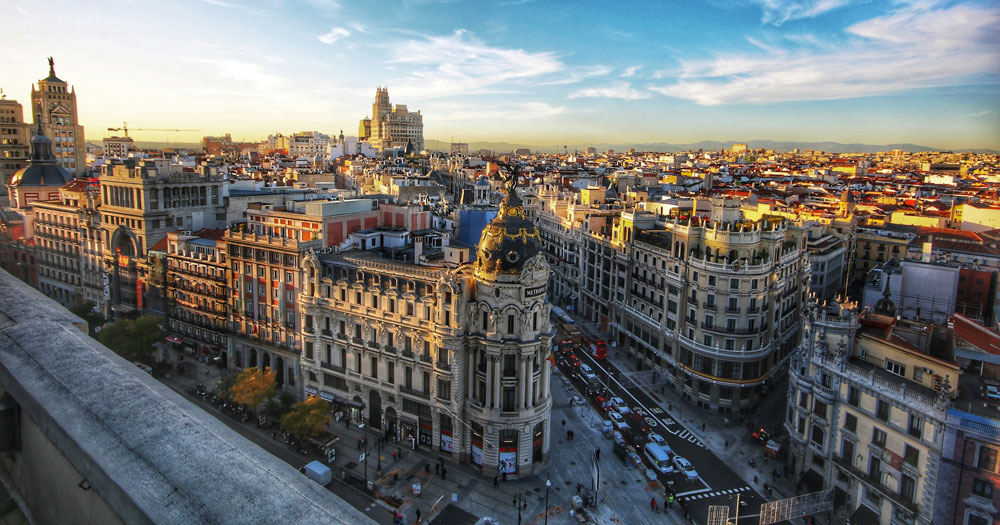Spain, a country of passion, history, and vibrant culture, has captivated the hearts of millions around the world.
From its sun-soaked beaches to its bustling cities, Spain offers a unique blend of tradition and modernity that’s hard to resist.
Whether you’re planning a trip or simply curious about this enchanting nation, these 33 fascinating facts will deepen your appreciation for Spain and might just inspire you to book your next vacation!
Thinking of travelling to Spain? Did you know that you can avoid expensive global roaming data using eSIMs? Learn more about eSIM’s vs. a traditional SIM here or see our eSIM stay connected with the best data rates with our Spain eSIM.
1. A Geographical Gem
Nestled in southwestern Europe, Spain occupies a prime location on the Iberian Peninsula. It shares borders with France and Andorra to the north, Portugal to the west, and the British territory of Gibraltar to the south.
Interestingly, Spain also has a land border with Morocco through its North African enclaves of Ceuta and Melilla, making it one of the few European countries with a physical connection to Africa.
2. Size Matters
When it comes to size, Spain doesn’t disappoint. It’s the largest country in southern Europe and the second-largest in the European Union, following France.
This expansive territory offers diverse landscapes, from the sunny Costa del Sol to the lush green hills of Galicia, providing endless opportunities for exploration and adventure.
3. A Royal Affair
Officially known as the Kingdom of Spain, the country has a rich monarchical history. The current monarch, King Felipe VI, ascended to the throne in 2014, continuing a tradition that dates back centuries.
While the monarchy’s role is largely ceremonial today, it remains an important symbol of national unity and cultural heritage.
4. Population Powerhouse
As of 2024, Spain boasts a population of approximately 47.3 million people. This diverse populace contributes to the country’s vibrant culture, with influences from various regions and historical periods blending to create a unique Spanish identity.
5. Madrid: The Heart of Spain
Not only is Madrid the capital and largest city of Spain, but it’s also the geographical center of the country.
All radial roads in Spain are measured from Puerta del Sol, a bustling square in the heart of Madrid. This central location has helped Madrid become a hub of culture, politics, and economics for the entire nation.
6. A Linguistic Tapestry
While Castilian Spanish is the official language of Spain, the country recognizes several co-official languages in various regions.
Catalan is spoken in Catalonia and the Balearic Islands, Basque in the Basque Country and parts of Navarre, and Galician in Galicia. This linguistic diversity reflects Spain’s rich cultural tapestry and regional identities.
7. A World Heritage Wonderland
Spain is a treasure trove of cultural and natural wonders, boasting an impressive 48 UNESCO World Heritage Sites.
This puts Spain among the countries with the highest number of such sites globally. From the stunning Alhambra in Granada to the otherworldly works of Antoni Gaudí in Barcelona, these sites showcase Spain’s incredible historical and artistic legacy.
8. Dining at the World’s Oldest Restaurant
For a truly unique culinary experience, head to Restaurante Botín in Madrid. Established in 1725, it holds the Guinness World Record for being the oldest continuously operating restaurant in the world.
Imagine savoring traditional Spanish dishes in a place that has been serving patrons for nearly three centuries!
9. La Tomatina: The World’s Biggest Food Fight
Every year, the small town of Buñol in Valencia province hosts La Tomatina, the largest food fight in the world.
Participants from all over the globe gather to throw ripe tomatoes at each other in a messy but incredibly fun celebration. It’s a unique Spanish tradition that perfectly captures the country’s festive spirit.
10. Olive Oil Capital of the World
Spain is the world’s largest producer of olive oil, accounting for about 40-45% of global production.
The country’s climate and soil conditions are perfect for olive cultivation, resulting in high-quality oils that are exported worldwide. Spanish olive oil is a cornerstone of the Mediterranean diet and a key ingredient in many traditional dishes.
11. A Wine Lover’s Paradise
Not only does Spain excel in olive oil production, but it’s also the second-largest wine producer globally.
Renowned wine regions like Rioja, Ribera del Duero, and Priorat produce exceptional wines that are celebrated worldwide. From crisp whites to full-bodied reds, Spanish wines offer something for every palate.
12. The Passionate Art of Flamenco
Originating in Andalusia, Flamenco is more than just a dance – it’s a powerful expression of emotion and culture.
Recognized by UNESCO as a Masterpiece of the Oral and Intangible Heritage of Humanity, Flamenco combines guitar music, singing, and dance in a mesmerizing performance that captures the soul of Spain.
13. The Sagrada Familia: A Masterpiece in Progress
Barcelona’s Basilica de la Sagrada Familia is perhaps the world’s most famous unfinished church. Construction began in 1882 under the direction of Antoni Gaudí, and it’s expected to be completed in 2026. This architectural marvel attracts millions of visitors each year, showcasing Gaudí’s unique vision and the dedication of generations of craftsmen.
14. A Silent National Anthem
Spain’s national anthem, “La Marcha Real,” is one of the few in the world without official lyrics. While various sets of lyrics have been proposed over the years, none have been officially adopted.
This instrumental anthem is a unique aspect of Spanish national identity.
15. The Two-Surname Tradition
In Spain, it’s customary for individuals to have two surnames – one from the father and one from the mother.
This tradition reflects the importance of family heritage in Spanish culture and provides a more comprehensive view of a person’s lineage.
16. Siesta: The Art of Midday Rest
The siesta, a short nap taken in the early afternoon, is a well-known Spanish tradition. While not as widely practiced in urban areas today, it remains common in smaller towns and villages, especially during the hot summer months.
This custom reflects Spain’s relaxed approach to life and work-life balance.
17. Football Fever
Spain is home to some of the world’s most famous football clubs, including FC Barcelona and Real Madrid. The rivalry between these two teams, known as El Clásico, is one of the most-watched sporting events globally. Football is more than just a sport in Spain; it’s a national passion that unites people across the country.
18. Literary Legacy: Don Quixote
Miguel de Cervantes’ “Don Quixote,” published in 1605, is considered the first modern novel and a masterpiece of world literature. This iconic work has been translated into over 140 languages and continues to influence literature and popular culture worldwide.
19. Longevity Leaders
Spain boasts one of the highest life expectancies in the world, with an average of around 82.4 years. This impressive statistic is often attributed to the Mediterranean diet, active lifestyle, and strong social connections prevalent in Spanish culture.
20. Embracing Natural Freedom
Since 1988, public nudity has been legal in Spain. While there are some local regulations, this liberal approach reflects Spain’s relaxed attitude towards the human body and personal freedom. Many beaches across the country have designated nudist areas.
21. A Climate for Everyone
Despite its reputation for sun and sand, Spain offers diverse climates to suit all preferences. While the Mediterranean coast enjoys hot summers and mild winters, regions like Asturias in the north experience significant rainfall and cooler temperatures. This variety makes Spain an attractive destination year-round.
22. Pioneering Education
Alcalá de Henares, a city near Madrid, is recognized as the world’s first planned university city. The University of Alcalá, founded in 1499, was designed as an integrated urban complex, setting a model for future university towns around the world.
23. Festivals Galore
Spain is famous for its vibrant festivals, each offering a unique glimpse into local culture and traditions. From the daring Running of the Bulls in Pamplona to the spectacular Fallas festival in Valencia, these events showcase the Spanish love for celebration and community.
24. A Palace Fit for Royalty
The Royal Palace in Madrid is the largest royal palace in Europe by floor area, covering an impressive 135,000 square meters. While it’s no longer the official residence of the Spanish royal family, it’s used for state ceremonies and is open to the public, offering a glimpse into Spain’s royal history.
25. A Culinary Adventure
Spanish cuisine is as diverse as its regions, with each area boasting its own specialties. From paella in Valencia to pintxos in the Basque Country, Spanish food celebrates local ingredients and traditional cooking methods. The country’s culinary scene is a delightful journey through history and culture.
26. The Canary Islands: A Tropical Paradise
While most people think of mainland Spain, the country also includes the Canary Islands, located off the northwest coast of Africa. These islands are known for their unique landscapes, including volcanic terrain and beautiful beaches, making them a popular tourist destination.
27. Moorish Influence
The Moors occupied Spain for nearly 800 years, leaving an indelible mark on Spanish culture, architecture, and language. This influence is particularly evident in southern Spain, where landmarks like the Alhambra in Granada showcase the stunning beauty of Islamic architecture.
28. Artistic Powerhouse
Spain has produced some of the world’s most renowned artists, including Pablo Picasso, Salvador Dalí, and Francisco Goya. Their works can be found in museums across Spain, with the Prado in Madrid and the Picasso Museum in Barcelona being must-visit destinations for art lovers.
29. A Novel Idea
“Don Quixote” by Miguel de Cervantes is not only considered the first modern novel but has also been translated into over 140 languages. This literary masterpiece has had a profound impact on world literature and continues to be celebrated globally.
30. Name Game
The Spanish naming tradition of using both paternal and maternal surnames provides a unique insight into family history. This custom allows individuals to honor both sides of their family and maintain a strong connection to their heritage.
31. Geographical Diversity
From the snow-capped peaks of the Sierra Nevada to the sun-drenched beaches of the Costa del Sol, Spain’s diverse geography offers something for everyone. This variety makes Spain an ideal destination for outdoor enthusiasts, offering activities from skiing to surfing.
32. Bar Culture
Spain has one of the highest densities of bars and restaurants per capita in the world, with approximately 300,000 establishments. This abundance reflects the importance of socializing and enjoying life in Spanish culture.
Whether it’s tapas in Madrid or pintxos in San Sebastian, the bar scene is an integral part of Spanish social life.
33. A Cultural Melting Pot
Spain’s rich culture is the result of centuries of diverse influences, including Roman, Visigothic, Islamic, and Christian traditions. This cultural melting pot has created a unique national identity that celebrates diversity while maintaining a strong sense of unity.
From its stunning landscapes and rich history to its vibrant culture and delicious cuisine, Spain offers a wealth of experiences for visitors and residents alike. These 33 facts only scratch the surface of what makes Spain such a fascinating country.
Whether you’re drawn to its sunny beaches, historic cities, or lively festivals, Spain has something to captivate every traveler. So why not start planning your Spanish adventure today? ¡Viva España!
33 Fun Facts About Costa Rica | 33 Fun Facts About France | 20 Fun Facts About Japan


